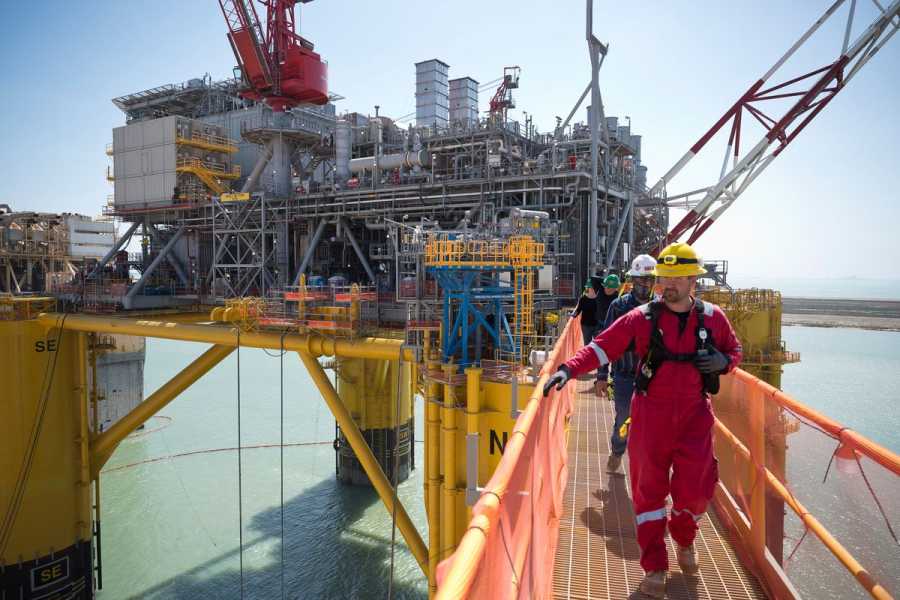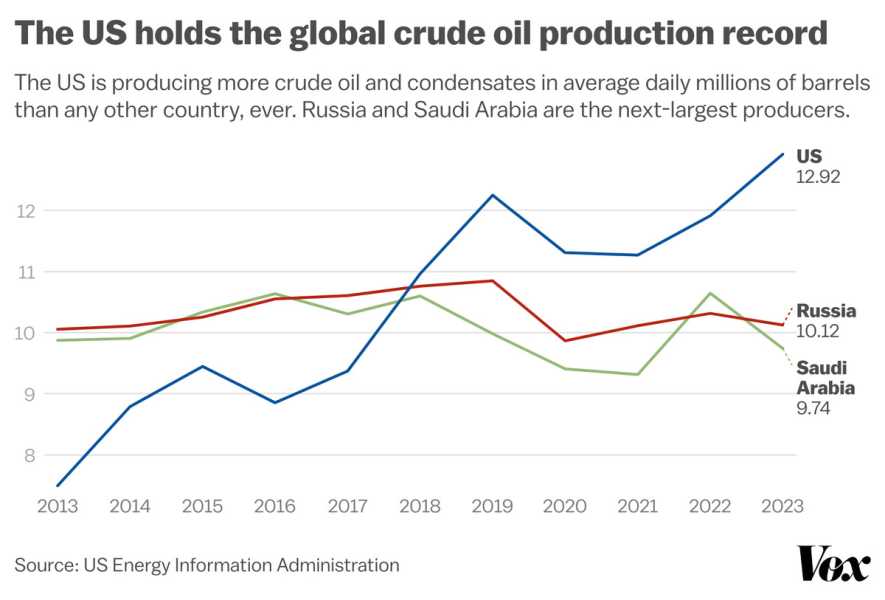Biden is not “waging war” on American energy. He’s boosting it.

Workers on the Shell Vito offshore oil platform while under construction onshore in Texas, in April 2022. Eddie Seal/Bloomberg via Getty Images Nicole Narea covers politics and society for Vox. She first joined Vox in 2019, and her work has also appeared in Politico, Washington Monthly, and the New Republic.
The US is the largest crude oil producer in the world, pumping out nearly 13 million barrels on average every day in 2023, an all-time record, according to new data from the US Energy Information Administration.
That’s an awkward milestone for President Joe Biden, who has arguably done more than any modern president to facilitate America’s transition away from fossil fuels to greener alternatives.
For the last six years, America has outstripped Russia, Saudi Arabia, and other OPEC countries in crude oil production. And it has picked up the pace under Biden, who had approved more permits for oil and gas drilling on public lands by last October than former President Donald Trump had by the same point in his presidency.

Nicole Narea/Vox
Biden has expedited the construction of an oil pipeline in West Virginia and approved the Willow oil project in Alaska, over the opposition of environmental activists and despite his 2020 campaign promise to stop drilling on federal lands altogether.
Increased oil production has helped keep gas prices low after they spiked in 2022, even as OPEC countries have slashed supply in an attempt to drive prices higher and despite disruptions to the global supply chain wrought by Russia’s war in Ukraine. American production, bolstered by advancements in drilling that improve efficiency, is also helping to meet what is projected to be record global demand in 2024.
But Biden’s challenge now, in an election year, is reconciling the country’s expanding oil sector with his claim in the State of the Union address last week that he’s “taking the most significant action ever on climate in the history of the world.”
What America’s oil production means for Biden’s climate politics
Biden does deserve credit for what he’s done to expand the nation’s energy options, said Alexandra Adams, senior adviser to the Natural Resources Defense Council Action Fund. In 2022, he signed the Inflation Reduction Act (IRA), which incentivized companies to produce more renewable energy technologies by creating funded tax credits and rebates for those technologies, penalized fossil fuel companies for excess methane emissions, and more.
“He’s confronting the climate crisis with powerful incentives to drive clean energy investment, cut costs, create jobs, and strengthen the supply chain for the building blocks of a modern economy,” she said. “Consumers deserve to be able to choose clean, renewable power instead of the fossil fuels that are driving the climate crisis. That’s what Biden’s energy strategy is all about.”
Since Biden signed the IRA, there has been close to $118 billion invested in factories to build solar panels, wind turbines, electric vehicles, advanced batteries and more.
The law is projected to reduce US greenhouse gas emissions by 43 to 48 percent from 2005 levels by 2035, after Trump had hindered progress on reducing emissions by withdrawing from the 2015 Paris climate agreement. And as a bonus, the legislation has created more than 102,000 jobs across the country.
Nevertheless, Republicans like to claim that Biden is waging a “war” on American energy. In September, the Republican-controlled House held a subcommittee hearing titled: “Biden’s War on Domestic Energy Threatens Every American.”
Trump has claimed on the campaign trail that America was “energy independent, soon to be dominant” while he was in office, even as the country is already producing more energy than it consumes.
Biden doesn’t like to talk about the oil boom he’s overseeing; in fact, when he talks about America’s oil industry, it’s typically been negative. He is, after all, relying on a base of Democratic voters who are passionate about climate to win reelection this year. In a December CNN poll, almost two-thirds of US adults said they were worried about the threat of climate change in their communities.
But he will have to walk a fine line in the campaign ahead: touting his climate accomplishments while hoping swing voters remember this fall that, despite stubborn inflation in other parts of the economy, gas is still pretty cheap.
Sourse: vox.com